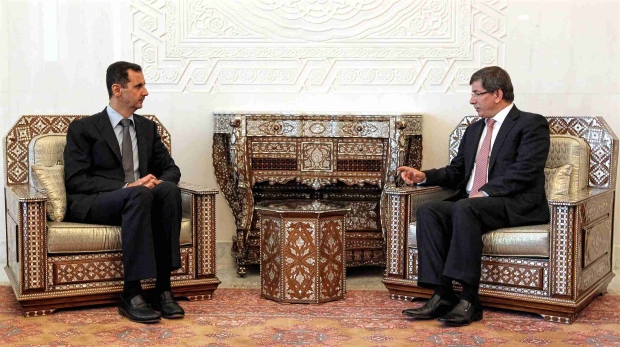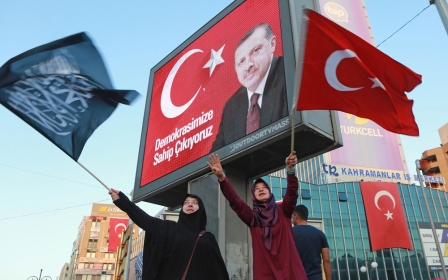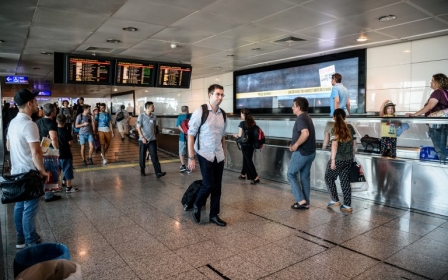EXCLUSIVE: Former Turkish PM warns Muslim ban a gift for 9/11 terrorists
President Donald Trump’s Muslim travel ban is the biggest gift the perpetrators of 9/11 could have imagined, Professor Ahmet Davutoglu, the former prime minister of Turkey, writes today exclusively in Middle East Eye.
The idea behind 9/11 was to drive a wedge between peoples, religions, societies and civilisations, the former prime minister, who also served as foreign minister, says.
And in an excoriating attack on the foreign policy of Trump’s 12-day-old administration, the former Turkish prime minister adds: “This Muslim ban will reward these perpetrators with a gift that they could never have imagined before.“
READ: Professor Ahmet Davutoglu on Obama and Trump, lessons and challenges
Professor Davutoglu calls the ban an “institutionalisation of Islamophobia as a government policy of a superpower” which will increase polarisation worldwide and activate the fault lines in societies, religions and civilisations.
He continues: “The securitisation of Islam and Muslims will drive a further wedge not only between the US and its own Muslim population, but also between the US and the larger Islamic world.”
Professor Davutoglu says it is an irony of history that Trump signed the Muslim ban on Holocaust Remembrance Day, "when the guiding principle of this remembrance should have been never to again stigmatise any people, religion or society collectively".
Danger in embassy relocation, Brexit support
Professor Davutoglu was prime minister of Turkey from August 2014 until May 2016, and foreign minister from May 2009 until August 2014. Still a member of parliament for the AK Party, he had a seat at the table for many of the major events in Middle East foreign policy during the last decade.
He highlights future dangers, including Trump’s declared intention of moving the US embassy in Israel from Tel Aviv to Jerusalem which, if implemented, would be a “fatal mistake”. Professor Davutoglu says the move would be inimical to US interests, almost certainly spark bloody conflict between Palestine and Israel and torpedo any chance of a two-state solution.
More importantly, the relocation would also further destabilise the region with a “further cycle of violence and bloodshed” that would “provide fertile political ground for extremism of all sorts to thrive in the region.”
“Jerusalem is not only Jerusalem,” Professor Davutoglu says. “It is not only a disputed issue between Israel and Palestine or even the Arabs as a whole, but is a much bigger potential source of friction."
The reversal and undoing of the European integration project would be one of the gravest mistakes since World War II
- Professor Ahmet Davutoglu
Professor Davutoglu then turns to the implications of Trump’s love affair with Brexit, and courting of European populist movements. He predicts that the president’s belittling of the European integration project and the downplaying of NATO would “shake the bond” between the transatlantic community which would again be counter-productive to US national interests.
“The reversal and undoing of the European integration project would be one of the gravest mistakes since World War II, and its consequences would be deep and far-reaching,” he writes.
“This process may once again give rise to the long-buried question of the balance of power in Europe. This would not only be tragic news for Europe, but it would also directly and immediately undermine the global standing of the United States.”
All three features of Trump’s foreign policy, along with the renewed assertion of US unilateralism, will diminish the US role and presence, both in the Middle East and the world, Professor Davutoglu predicts.
How Obama failed in the region
The lessons of Barack Obama’s foreign policy failures are not being learned, the former Turkish prime minister warns, discussing three major foreign policy failures of the past decade: Israel-Syria peace talks, Syria and the Iran deal.
The first was when Professor Davutoglu led the Turkish mediators who presided over peace talks between Israel and Syria which, it was hoped, would produce a framework agreement for a peace deal by the end of 2008. Instead, the bid was derailed by Israel’s decision to invade Gaza.
“We naturally felt betrayed by the fact that Israel had once again chosen war at the very moment that the prospect of a peace deal with Syria was becoming attainable,” says Professor Davutoglu “and that they failed to inform us about their intention to go to war, despite the fact that Israel’s then-prime minister Ehud Olmert had a long talk over dinner with our then-prime minister Recep Tayyip Erdogan in Turkey only days before the invasion.”
Professor Davutoglu believes a treaty could have transformed the region. “Yet, to our dismay, the Obama administration chose not to invest any energy or effort in reviving this initiative.”
“We informed our American counterpart about the deal. Yet the US administration was rushing to declare the Assad regime as illegitimate, which it did only a week after we agreed upon the framework deal.
“Needless to say, during the same time period, the Assad regime also violated the terms of this framework deal several times. Thereafter, we also cut all the contacts with the regime."
'Five years later, the P5+1 had to settle on a deal at a time when Iran had achieved a much higher level of enrichment'
- Professor Ahmet Davutoglu
Even on the nuclear deal with Iran, the former Turkish prime minister writes that Obama had to settle for a less favourable deal than the one that Turkey and Brazil had negotiated with Iran in May 2010.
He recalls how he and Celso Amorim, foreign minister of Brazil, negotiated with Tehran for 17 hours without a break in May 2010, then informed the US about their intention to settle the dispute.
“We expected a positive response from Washington, but the Obama administration rebuffed the deal, only because it wasn’t achieved by the P5+1.
“At that time, Iran’s level of enrichment capacity was relatively low. Five years later, the P5+1 had to settle on a deal at a time when Iran had achieved a much higher level of enrichment.”
Obama’s ‘irresponsible policies’
Finally, Professor Davutoglu believes that the Obama administration's objective in Iraq was “getting out” rather than “getting Iraq right”.
The former Turkish foreign minister argues that Obama’s biggest foreign policy failure came in 2013, when he was equivocal in his response to the breach of his red lines in Syria and to the military coup in Egypt.
"Obama’s inaction on both fronts encouraged dictators to commit further atrocities to retain power, fed the extremist narrative and undermined democracy," he says, adding that 2013 was key to the exponential expansion of IS the following year.
'Obama’s inaction on both fronts [Syria and Egypt] encouraged dictators to commit further atrocities to retain power, fed the extremist narrative and undermined democracy'
- Professor Ahmet Davutoglu
But it also sent signals to others that they could count on US inaction, he argues, saying that Vladimir Putin would not have been so active in Crimea and Ukraine in 2014, and in Syria in 2015 had the Obama administration been able to match its words with deeds.
“Russian activism from Ukraine to Syria, and from Crimea to Libya, is all the direct result of the fading away of the deterrence built on the US commitment to upholding the rules and principles of international law and its declared goals, be it by default or by design,” Professor Davutoglu writes. He says future historians will treat 2013 as the year that shaped the course of ensuing decades.
“Most of the malaises associated with [George W Bush’s] half-baked and short-sighted policy of interventionism, particularly but not exclusively in the Middle East, were mirrored in Obama’s misplaced policy of withdrawal from the Middle East,” Professor Davutoglu says.
“The idea and mindset of ‘withdrawal’ from the Middle East seems to have afforded the Obama administration the space to pursue inconsequential, ineffective and irresponsible policies towards the region.”
History’s verdict on Obama, Professor Davutoglu concludes, will be a damning one. Despite his rhetoric, Obama “chose to be a prisoner of the status quo” rather than a transformative foreign policy figure.
This article is available in French on Middle East Eye French edition.
Stay informed with MEE's newsletters
Sign up to get the latest alerts, insights and analysis, starting with Turkey Unpacked
Middle East Eye delivers independent and unrivalled coverage and analysis of the Middle East, North Africa and beyond. To learn more about republishing this content and the associated fees, please fill out this form. More about MEE can be found here.





